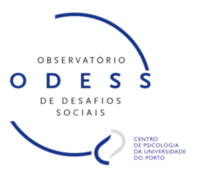The Observatory of Social Challenges is the result of the periodic application of a questionnaire to residents in Portugal on various relevant social issues. An annual survey allows us to “take a snapshot” of the Portuguese population’s perspective on the topics under study in a given year, but also to track and monitor the evolution of these attitudes over time.
Questionnaire themes
The ODESS questionnaires include several topics of social relevance, in the area of expertise of each researcher on the Observatory team. Considering the high number of topics worked on by the Observatory team, the first two waves of data collection included two collection moments, across which the topics worked on by the Observatory team under study were distributed. The table below presents the topics present in each wave and collection moment to date. The questionnaire is designed with the aim of completing it in an average time of 15 minutes.
| Wave 1 – 2021/2022 | Wave 2 – 2022/2023 | Wave 3 – 2024 | ||
| 1st moment | 2nd moment | 1st moment | 2nd moment | |
| Attitudes towards retirement Work and family Relationship with work Consumption and savings habits Perception of corruption National policy issues Mindfulness and emotional intelligence | Discrimination and adjustment Attitudes towards prostitution Attitudes towards intersectional discrimination | Attitudes towards retirement Work and family Relationship with work Consumption and savings habits Perception of corruption National policy issues Mindfulness and emotional intelligence | National policy issues Attitudes towards prostitution Attitudes towards intersectional discrimination Psychosocial risk factors in the workplace | Attitudes towards retirement Work and family Relationship with work Consumption and savings habits Perception of corruption Discrimination and adjustment |
Sample and data collection methodology
The data collection methodology of the Observatory of Social Challenges is, in general, identical at all times, with the fieldwork being carried out by a company specializing in opinion research.
Thus, representative samples of the Portuguese population are collected, with a minimum of 1000 complete and validated participations, which comply with quotas for sex, age group (3 groups: 18-34 years, 35-54 years and 55+ years) and region (NUTS II – 2013). The participations are collected through self-administered online interviews (C.A.W.I. method – Computer-Assisted Web Interviewing), with the exception of the first moment of Wave 1, in which the collection methodology was mixed, being online and telephone (C.A.T.I. method – Computer-Assisted Telephone Interviewing).
Ethical issues
The implementation of this study complies with the ethical standards and principles described in the Declaration of Helsinki and the Ethical Code of Academic Conduct of the University of Porto, regarding the treatment of human beings during the execution of scientific research. Thus, the principles of autonomy, beneficence, non-maleficence and justice are respected. Informed consent is obtained from participants before data collection begins, and they are informed of the purpose of the study, the risks and benefits of participation, the possibility of withdrawal at any time without prejudice to themselves, and the anonymous and confidential nature of the data. Email contacts of the Observatory members responsible for each topic of the questionnaire are also provided, to enable participants to ask questions.
The company carrying out the field work always complies with the EU General Data Protection Regulation (GDPR). The final databases are anonymized, so the Observatory data do not allow the identification of participants by researchers from the Observatory and others with access to this data.
